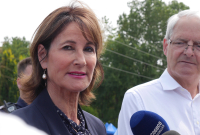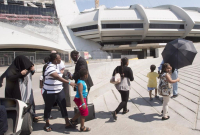Support strong Canadian climate journalism for 2025
Municipal politicians in this eastern Ontario community said Monday they were frustrated at the paucity of information from the federal government over an influx of Haitian asylum seekers crossing to Canada from the United States.
"There are mixed feelings in our community on what we think they should be doing and shouldn’t be doing," said Cornwall Mayor Leslie O’Shaughnessy at a special meeting Monday evening to give municipal leaders an update on the arrival of hundreds of Haitian refugees the federal government has decided to send to their town.
About three dozen local residents overflowed the tiny Cornwall council chamber to hear an update from officials from the Immigration Department and the Canada Border Services Agency, as well as their own local representatives.
O’Shaughnessy appeared less than enthusiastic by the answers from the senior federal officials from the departments, and called on them to return to Cornwall to answer questions from the public directly.
"We do not want to create a situation where we are dividing, having divisions within our community," the mayor said, adding the way to avoid that was "to provide proper and clear information to them in a timely manner."
Bradley Nuttley, the municipality’s emergency response chief, described how the Canadian Forces was building "a tent city for lack of a better word" on the corner of a lawn of a tiny, privately run conference centre. It is to provide temporary accommodation for 500 people for the coming months while they wait for their asylum claims to be processed.
"Can you image the noise that’s going to come out of there?" John Thomson, 70, who lives near the tents, said after the meetings. "This was a lousy meeting with no questions."
However, about a dozen others in the public gallery applauded when Coun. Elaine MacDonald said she hoped some of the migrants stay in Cornwall and abandon their aspirations to move to Montreal.
Jules Bourdon, 73, said Haitians could offer Cornwall the chance to boost the number of French−language speakers, which he said is only at about 20 per cent.
"I’m not against new immigrants coming to the region, and I hope we can integrate them here."
Const. Daniel Cloutier, a Cornwall police spokesman, said almost 300 Haitians have arrived recently and, so far, there have been no problems and none are anticipated.
About 3,800 people crossed into Quebec in the first two weeks of August following the 2,996 who crossed in July after the Trump administration said it may end "temporary protected status" for Haitians in the U.S. following their country’s massive 2010 earthquake.
Last week, federal Transport Minister Marc Garneau announced a temporary shelter would be set up in Cornwall.
The newcomers are being housed at the Nav Centre, which is run by Nav Canada, the private non−profit corporation that owns and operates the country’s civil air navigation service. The military is erecting tents on its grounds.
The centre sits on more than 28 hectares of parkland abutting the St. Lawrence Seaway and is billed as a government conference centre with all the amenities of a luxury resort. Its website boasts more than "comfortable" rooms, as well as a swimming pool, sauna, fitness centre and outdoors sports fields.
But because the centre has bookings planned for the fall, the new arrivals need to be moved elsewhere.
On a sweltering Monday afternoon, a handful of new arrivals lingered on the manicured lawns of the centre’s entrance. Mary Jean, 34, said she arrived three days ago, alone with her four−year−old daughter, after living five years in New York City.
"The government tried to hurt people, so that’s why I came here. I’m young, I want to study, and then work," Jean said. "Maybe I’ll get a better life."
Scott Bardsley, a spokesman for Public Safety Minister Ralph Goodale, said the Canada Border Services Agency conducted security screening on the new arrivals and "they are admissible to Canada, they are not being detained."
The Nav Canada site is considered temporary housing while asylum seekers wait for interviews with immigration officials to determine their eligibility for a hearing at the Immigration and Refugee Board, he said in an email.
Coun. Bernadette Clement, who welcomed the new arrivals last week, said the community is "fairly receptive" to the new arrivals and are especially interested in fate of children, who account for one in five of the new arrivals.
Marie Rode Duran, a Toronto French immersion teacher originally from Haiti, was waiting Monday afternoon at the Nav Centre’s entrance, trying to reconnect with a young mother and her three−year−old daughter who recently made the trek from the U.S.
"We’re from Haiti too, so we feel we need to help them," she explained. "They need information − where to go, what to do, explain (to) them how Canada works."




Comments